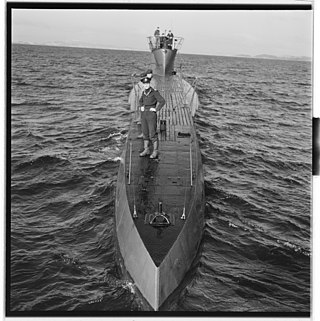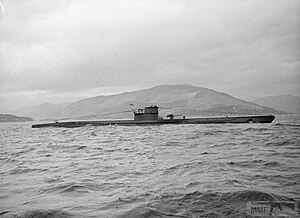
German submarine U-1274 was a Type VIIC/41 U-boat built for Nazi Germany's Kriegsmarine for service during World War II. She was ordered on 13 June 1942, and was laid down on 21 June 1943 by Vegesacker Werft AG, Bremen as yard number 69, launched on 25 January 1944 and commissioned on 1 March 1944 under Oberleutnant zur See Fedor Kuscher.
German submarine U-1203 was a Type VIIC U-boat built for Nazi Germany's Kriegsmarine for service during World War II. She was laid down on 15 May 1943 by Schichau-Werke, Danzig as yard number 1573, launched on 9 December 1943 and commissioned on 10 February 1944 under Oberleutnant zur See Erich Steinbrink.
German submarine U-956 was a Type VIIC U-boat built for Nazi Germany's Kriegsmarine for service during World War II. She was laid down on 20 February 1942 by Blohm & Voss, Hamburg as yard number 156, launched on 14 November 1942 and commissioned on 6 January 1943 under Oberleutnant zur See Hans-Dieter Mohs.

German submarine U-999 was a Type VIIC/41 U-boat of Nazi Germany's Kriegsmarine during World War II.

German submarine U-1005 was a Type VIIC/41 U-boat of Nazi Germany's Kriegsmarine during World War II.

German submarine U-1007 was a Type VIIC/41 U-boat of Nazi Germany's Kriegsmarine during World War II.

German submarine U-1009 was a Type VIIC/41 U-boat of Nazi Germany's Kriegsmarine during World War II.

German submarine U-1010 was a Type VIIC/41 U-boat of Nazi Germany's Kriegsmarine during World War II.

German submarine U-1103 was a Type VIIC/41 U-boat of Nazi Germany's Kriegsmarine during World War II.

German submarine U-1109 was a Type VIIC/41 U-boat of Nazi Germany's Kriegsmarine during World War II.

German submarine U-904 was a Type VIIC U-boat of Nazi Germany's Kriegsmarine during World War II.

German submarine U-922 was a Type VIIC U-boat of Nazi Germany's Kriegsmarine during World War II.

German submarine U-926 was a Type VIIC U-boat of Nazi Germany's Kriegsmarine during World War II.

German submarine U-975 was a Type VIIC U-boat of Nazi Germany's Kriegsmarine during World War II.

German submarine U-982 was a Type VIIC U-boat of Nazi Germany's Kriegsmarine during World War II.

German submarine U-1052 was a Type VIIC U-boat of Nazi Germany's Kriegsmarine during World War II.

German submarine U-1162 was a Type VIIC U-boat of Nazi Germany's Kriegsmarine during World War II.

German submarine U-1192 was a Type VIIC U-boat of Nazi Germany's Kriegsmarine during World War II.

German submarine U-1194 was a Type VIIC U-boat of Nazi Germany's Kriegsmarine during World War II.

German submarine U-1201 was a Type VIIC U-boat of Nazi Germany's Kriegsmarine during World War II.




